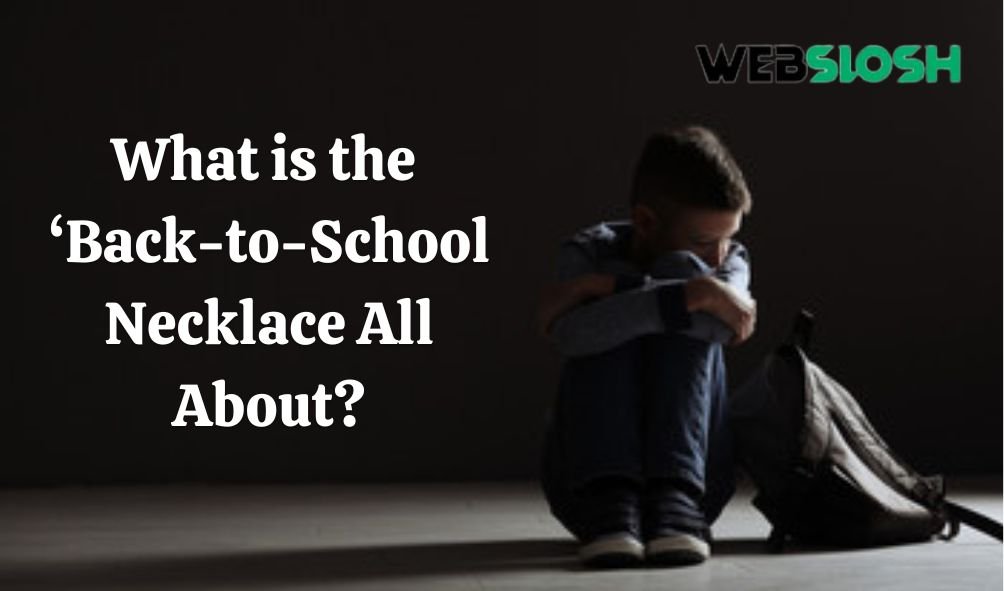I’m sure you’ve heard of the ‘back-to-school necklace suicide’, right? I mean, you can’t exactly go anywhere without hearing this buzz around the internet (and if we’re honest with ourselves — why would you even want to?). Well, if you’ve somehow blocked it out of your memory or are new to the internet, here’s a quick rundown: A few years ago, a trend emerged called “the back-to-school necklace suicide.”
What is the ‘Back-to-School Necklace?
The Urban Dictionary describes a back-to-school necklace as “another name for a noose. This is due to the utter despair you feel when school starts back up again.” Some examples of its usage include: “I’m about to buy my back-to-school necklace,” “I can’t wait to buy that back-to-school necklace,” “That back-to-school necklace is calling me,” and “I can’t wait to wear that back-to-school necklace.”
Despite its seemingly innocent meaning, a back-to-school necklace is actually a cry for help as it’s a code for death by hanging.
Parents can help their children better if they are educated about this term.
How Should Parents talk about this trending Back-to-School Necklace Phrase with their Children?
It’s important for parents to not only talk about suicide but also listen to their children when they express thoughts of wanting to die. It’s also important for parents to make sure their child has access to professional help if they need it.
See also – Why Parents Need to Know What ‘A Back-To-School Necklace’ Means
How to Help your Child’s Mental Health?
Mental health is just as important as physical health. As a parent, you can play a role in helping your child develop a strong sense of self-esteem and confidence.
Here are some tips on how to help your child’s mental health:
1. Encourage social connections
Being part of a community and having friends helps kids feel good about themselves and boosts their self-confidence. Encourage your child to spend time with other children and adults they enjoy being around. Help them find ways to connect with others through activities they enjoy such as sports or music lessons.
2. Set expectations for yourself and your children
Children look up to their parents, so it’s important that you set an example for them by demonstrating positive behaviors like respecting others, following rules, and being kind.
3. Be aware of bullying situations at school or online
Bullying can have serious effects on kids’ mental health, so it’s important that you watch out for signs that they might be being bullied at school or online — such as withdrawing from activities they used to enjoy; changes in behavior; sleep problems; sadness or depression; headaches or stomachaches; difficulty concentrating; feeling hopeless, worthless or suicidal thoughts; anger issues or aggressive behaviors
4. Listen carefully
When your child wants to talk about something, let them do so without interruption or interruption from other siblings or pets. Let them finish what they want to say before jumping in with advice or opinions of your own (unless it’s really urgent). If your child needs help opening up, try asking “what do you think would happen if…?” or “how did that make you feel?
Warning Signs of your Child’s Depression
Depression is a serious mental illness that affects the way you feel and thinks about yourself, the world, and other people. It can be accompanied by anxiety, low self-esteem, guilt, or anger, and can lead to suicidal thoughts and behavior.
The following signs may suggest that your child has depression:
- They’re always sad or tearful.
- They seem irritable or tense most of the time.
- They’re sleeping a lot more than usual, or not wanting to go to sleep at night.
- They lose interest in activities they used to enjoy, such as going out with friends or hobbies like playing an instrument.
- They’re having trouble concentrating on things at school or home.
Also recommended – https://lifeunited.org/why-instagram-deleted-my-account-for-no-reason/
